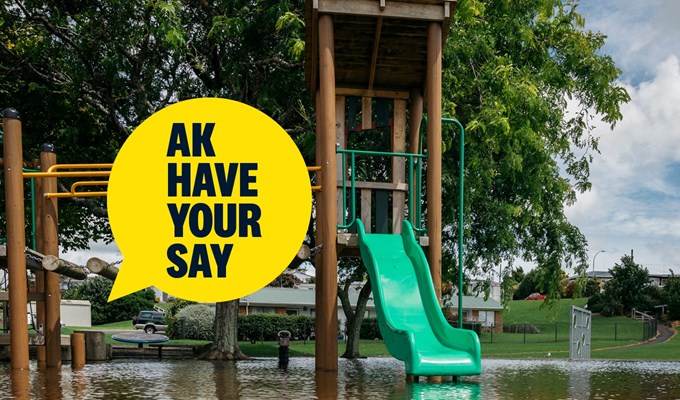Throughout August, Aucklanders are being invited to provide feedback on plans for major investment in Tāmaki Makaurau to help recover from the extreme weather events that took a major toll on the region in 2023. The scale and complexity of the challenges is significant, and Auckland Council is charting a path for recovery that will improve resilience to storms and empower communities to take action.
Tomorrow will kick off four weeks of engagement so Auckland Council can hear from Aucklanders on two programmes:
- The Tāmaki Makaurau Recovery Plan – to understand Aucklanders’ experiences of extreme weather earlier this year, and their needs and aspirations for recovery and resilience.
- Making Space for Water – to comment on a series of stormwater projects that will reduce future flood risk.
Mayor Wayne Brown says Aucklanders’ feedback on these plans for important projects that will shape Auckland’s future is vital.
“The Tāmaki Makaurau Recovery Plan is to focus on the longer-term recovery and help us respond to the considerable challenges we face. In addition, we have identified nine initiatives that can help to manage flood risks that we call Making Space for Water.”
Mat Tucker, Auckland Council’s Group Recovery Manager, says the focus for the recovery is building smarter, in partnership with central government, iwi, and Aucklanders.
“We want to hear more about how the storms this year affected homes and communities, so we can consider what’s needed to achieve more resilience for our city.”
“We have been working closely with groups of affected property owners across the region, but we know that the impacts of the storms extend beyond homes into communities. This consultation provides an opportunity for all Aucklanders to have their say and shape how we recover together.”
“Climate change means we can expect to see more frequent extreme weather events, and we have the responsibility now to change the way we work with nature to soften the blow when storms come,” says Mr Tucker.
Nick Vigar, Healthy Waters Head of Planning, says that changing our thinking around the traditional piped approach to stormwater management is needed to recognise the changing weather patterns we will experience.
“Storms cause damage when we see extremely heavy rainfall that is beyond what our pipes are built to handle, and the water’s natural flow path is blocked by buildings or debris, he says”
“It’s not practical to build pipes big enough to take all stormwater from every conceivable event so we need to make space for water to flow safely through communities without causing damage to people and properties”.
The council is working with central government on solutions for homes that were affected by extreme weather this year, or those that may be at risk in the future. In some cases, engineering solutions may be enough to mitigate future risk, but where there is no practical or affordable solution, properties may need to be removed.
The proposed Making Space for Water programme includes removing properties from high flood risk areas and creating new parks and reserves that are available to communities on dry days, while providing open spaces for water to flow through the landscape during storms, called ‘blue-green’ networks.
Other recommended initiatives include increased maintenance, improvements to culverts and bridges, and stream rehabilitation.
“Auckland has over 15,000km of streams, these initiatives will make significant improvements in the way we manage flood risk and stream health. Healthy streams perform better when dealing with high water volumes, and rehabilitation work could involve stabilising banks and native planting to reduce erosion and improve water flow.”
Community-led flood resilience will also be an important aspect of the programme.
Mr Tucker says that the council also has a role in ensuring Aucklanders know what to do before, during and after a flood.
“We want to empower communities to mitigate flood risks before a flood happens. Knowing more about how floods happen and being prepared is part of the challenge of learning to live in our new environmental reality.”
Aucklanders can have their say online or in person. Community drop-in sessions will be held from tomorrow, and times and dates for these are available on the AK Have Your Say website. Also available on the site will be an online submission form, translated materials, and details of online information sessions.
The results of this public engagement will be reported back to the council’s Governing Body in September and will be used to inform the final shape of both programmes. We encourage Aucklanders to have their say here: www.akhaveyoursay.nz/stormrecovery.
Auckland Council is also currently consulting on the Auckland Civil Defence Emergency Management Group Plan, click here for details.


